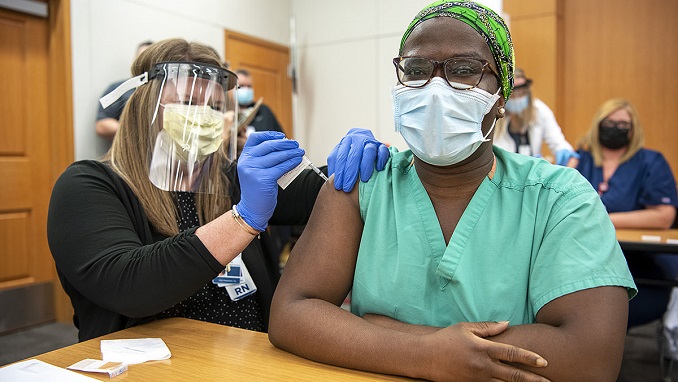COVID-19 vaccination hesitancy dropped more rapidly among Black people than among white people since December 2020, though the rate of vaccination is still lower among Black Americans, according to a recent study.
Based on a survey of 1,200 U.S. adults, the study, published Jan. 21 in the Journal of the American Medical Association, found Black adults were more likely to change their mind about COVID-19 vaccination than white adults.
“A key factor associated with this pattern seems to be the fact that Black individuals more rapidly came to believe that vaccines were necessary to protect themselves and their communities,” said the study. “Vaccination rates continue to be lower among Black individuals than white individuals, but these results suggest that this might be less likely the result of vaccine hesitancy than other factors.”
COVID-19 disproportionately affected Black communities in the United States, with greater case rates, more fatalities, and more severe economic consequences than other racial and ethnic populations. This makes addressing hesitancy in the Black community especially important.
Reasons for vaccine hesitancy in the Black community
As one expert has explained, Black vaccine hesitancy has roots in historical distrust.
“During the AIDS epidemic, the number one issue we faced was the distrust. That was our biggest paralytic element to overcome for positive community action,” said Dr. Reed Tuckson, creator of the Black Coalition Against COVID-19, in a BIO podcast with Phyllis Arthur, BIO’s VP of Infectious & Diagnostics Policy. “How is it possible that 40 years later the number one issue that we are facing with this COVID pandemic in the African-American community is the issue of distrust?”
Dr. Tuckson explained the history behind Black distrust of the medical establishment. He said the distrust is a legacy of slavery, the Jim Crow era, and the Tuskegee syphilis experiment—in which healthhy Black men were intentionally infected with syphilis and then denied treatment as part of a “study.” He urged organizations to rise to the occasion, in order to demonstrate that science is our ally, not our adversary.
The authors of this new study say hesitancy is becoming less of an issue, but figures show that barriers are still preventing vaccine equity. “These figures, along with our own findings, underscore the need to ensure that research and practical efforts focus on the access barriers faced by those willing to be vaccinated,” they said.




